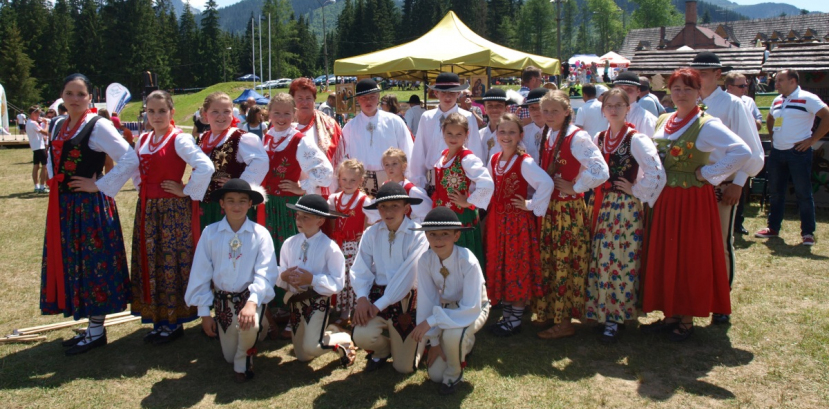Kościelisko is a village located in the Sub-Tatra Trench, which is a valley stretching from east to west, and separating the Tatras from the Gubałówka Foothills. Thanks to such a lie of the land the place offers extraordinarily scenic and panoramic views to be enjoyed by the locals as well as crowds of tourists who come here in both summer and winter to savour the unusual Podhale microclimate, the traditional folk culture and mountain tourism. Often referred to as the “Heart of Podhale,” well into the 19th century Kościelisko used to be called ‘Polany,’ because originally it was made up of a group of 21 polany (shepherd settlements). The shape of the unique Podhale folklore was affected by a number of factors, ranging from the Wallachian colonisation (a wave of migration and settlement of the Wallachians coming from the Balkan Peninsula), through brigandage, herding-related culture, a peculiar microclimate, to the popularity of Podhale as a holiday-making and spa region among men of letters, politicians, scientists, doctors, musicians and artists at the turn of the 19th and 20th centuries.
The POLANY ensemble boasts a long-standing tradition, because it was established in 1947 at Władysław Jagiełło Primary School in Kościelisko, on the initiative of Helena Knurowska, who was a Polish language and culture teacher, a native highlander and sister of poet Stanisław Nędza-Kubiniec. The initiator was actuated by the motivation to preserve the traditional folk culture of the Rocky Podhale.
The Festival audience will have an opportunity to see a programme entitled Haying – Give Us Fine Weather, Oh Lord. The mother is about to leave for the market to sell shirts, and the children are to stay at home and rake the hay. In order to ensure fine weather, the children sing a religious song of supplication they were taught by their grandmother. The elder boys are driving hay poles into the ground, while the girls are doing grabanki (raking). One of the sisters is looking after her younger siblings. Just when the work appears to be coming to its end, some musicians are spotted passing by. The eldest sister invites them inside the house for some snack. In front of the house some dancing and traditional folk games get underway.
Anna Michalik is the ensemble leader, Anna Watycha and Bartłomiej Gąsienica-Sieczka are dance instructors, and the musical band, playing (primary and secondary) violins as well as the Podhale double bass, is headed by Bartłomiej Gąsienica-Sieczka.
The POLANY ensemble boasts a long-standing tradition, because it was established in 1947 at Władysław Jagiełło Primary School in Kościelisko, on the initiative of Helena Knurowska, who was a Polish language and culture teacher, a native highlander and sister of poet Stanisław Nędza-Kubiniec. The initiator was actuated by the motivation to preserve the traditional folk culture of the Rocky Podhale.
The Festival audience will have an opportunity to see a programme entitled Haying – Give Us Fine Weather, Oh Lord. The mother is about to leave for the market to sell shirts, and the children are to stay at home and rake the hay. In order to ensure fine weather, the children sing a religious song of supplication they were taught by their grandmother. The elder boys are driving hay poles into the ground, while the girls are doing grabanki (raking). One of the sisters is looking after her younger siblings. Just when the work appears to be coming to its end, some musicians are spotted passing by. The eldest sister invites them inside the house for some snack. In front of the house some dancing and traditional folk games get underway.
Anna Michalik is the ensemble leader, Anna Watycha and Bartłomiej Gąsienica-Sieczka are dance instructors, and the musical band, playing (primary and secondary) violins as well as the Podhale double bass, is headed by Bartłomiej Gąsienica-Sieczka.

